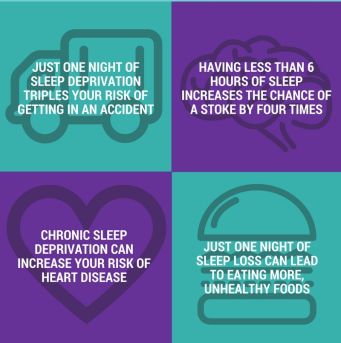It does not come as much surprise hearing college-aged adults should be getting eight plus hours of sleep a night. What may come more as a surprise is how few students actually get that much sleep.
According to a survey conducted by The Huffington Post, less than 50 percent of adult Americans actually get the recommended hours of sleep of seven to nine hours per day. The Huffington Post later followed up with an article all about sleep deprivation effects. Could this lack of sleep have something to do with the often new-found freedom? Maybe. A much larger factor that plays into this equation is the stress students, and adults, feel in their everyday life. This stress often manifests as fully active days and sleepless nights.
Sadly, I am a student with a first-hand experience with school, stress and even sleep deprivation.
My first year of college I put in 110 percent in everything I did. This typically is not a bad thing, however, enrolled in 17.5 credits, working 25 to 30 hours every week and learning to manage my new college life had quickly taken its toll on my body.

My first year I was sick at least once a month. Silly me did not see this as a sign from my body telling me to slow down. I would take cold medicine when it felt necessary and just move on, completely ignoring my body. I continued to push my body well beyond my breaking point for months.
Fast forward to Fourth of July weekend, 2015. Some friends and I made the trip up to the Poconos for the week. Everything was going great; we had fun skateboarding, setting off some fireworks and even enjoyed a day on the water. We were all having fun. That is until one day I woke up unable to speak. I knew what I wanted to say but suddenly was unable to. The few words I was able to speak were sandwiched between stammers.
It slowly got better throughout the day but was still alarming enough for the group to make the unanimous decision to cut the trip short.
Upon returning home I called my doctor. He had taken my concern to fear after I told him my symptoms: agonizing and constant headaches in the same spot, trouble speaking, losing my grip on objects and even having occasional tremors.
He said the one thing I feared the most. “The only thing I can think of is a brain tumor.” Those words reside with me to this day. At 19 years old I was terrified my life would be cut short before even really getting a chance to live.
Fortunately, my CAT scan did not show any signs of a tumor. Unfortunately, we were back to square one. After being pinballed from doctor to doctor I was finally seen by a neurologist mid-October of 2015, almost three months later.
He reiterated what the CAT scan showed by saying the possibility of even a small tumor was extremely unlikely. He did say something that left me almost as scared as the thought of having a brain tumor; he said my body and brain were in the process of shutting down. The past year of pushing myself, running on maybe a handful of hours of sleep a night had started killing my body.
No medicine in the world could fix this problem. The only thing that could be done is rest, wait and hope for the best.
One of the first questions I almost always get asked when bringing this up is if it was like A Nightmare on Elm Street where the main characters had not slept for days and started having micro-naps. Being the horror film buff I am, I was somewhat sad I did not get to see Freddy Kruger running around a boiler room that would appear out of nowhere. I did, however, have occasional hallucinations, blurring of my vision at random times and even felt numb to the world— almost as if my body was present, but my mind was elsewhere.
My appearance had changed dramatically as well in just a short period of time. My usual thick hair had become thin and lifeless, wrinkles surfaced under and around my eye and dark circles emerged under my eyes. I started to look as if I were to be welcomed into the Black Parade any day now. I had lost a dangerous amount of weight; my eyes were so puffy and swollen some days it looked like I had spent the whole night awake crying.
Over a year later I am still facing issues every day. Fortunately, appearance wise everything is just about back to normal. I still find myself stammering or forgetting words all together and can often be seen playing with my hands so I do not have to feel the tiny, constant muscle spasms in my hands and arms.
And to think that all of this could have easily been avoided by just closing my books well before three or four o’clock in the morning. Although some may or may not ever experience sleep deprivation and those who have quite very well had a completely different experience, trust me when I say that nothing is more important than your sleep. I’ve learned to call it quits well before the sun starts to come up now.
Sorry professors, but a good night’s sleep is much more important to me now than pulling an all-nighter in hopes of getting an A on that paper or test.



